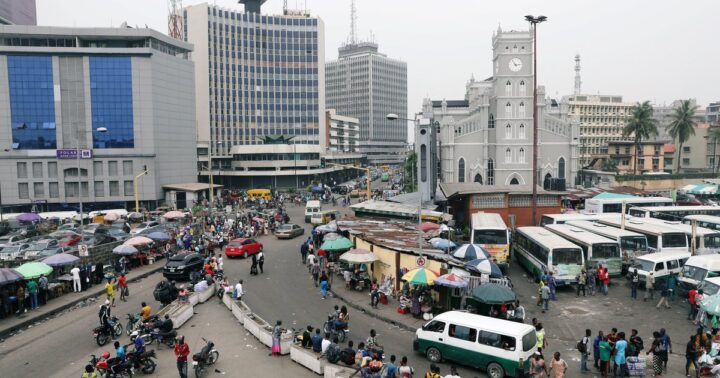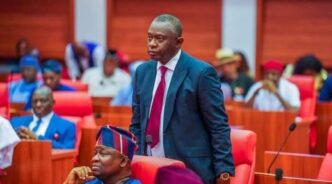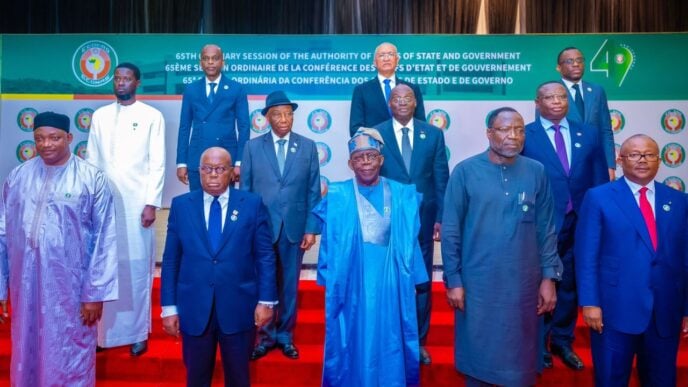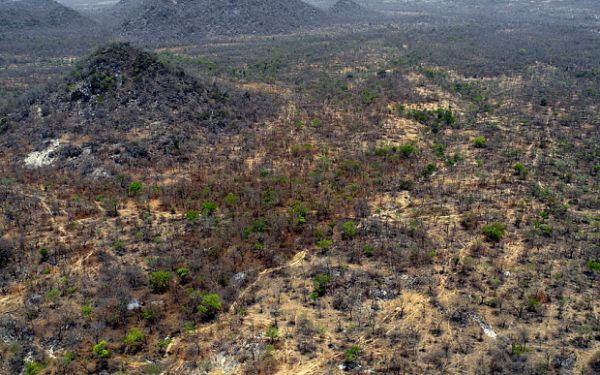How many disenfranchised, down-on-their-luck, potentially violent, angry, people – justified or not – does it take to ground a country of say 50 million people? 1,000 is enough. Yes, a thousand people can do the job if they are strategic and backed as usual by faceless financiers, after all, it is easier to disrupt than to organise, to scatter than to put together, to incite than to administer, to destroy than to build.
The people who killed other people’s businesses in Nairobi two weeks ago, just like those who destroyed Lagos and other capital cities in Nigeria in October 2020, don’t have to be more than 1,000. By the time those guys were in full operation, in a frenzy of destruction, normal people would have retreated to the safety of their homes, even those who had been part of normal protests. Many in Nairobi and Lagos were actually out demonstrating while their shops were being looted, destroyed and burnt – often in the middle of the night.
Or maybe it’s 10,000 disenfranchised folks that it takes to shake a nation to its core. Or 100,000. Or even a million. I am looking at the proportion here, and how quickly the agitations of a people can drive mass fear, and hysteria, and escalate to totally destructive mass insanity, from which a country may not recover for years or decades. I am not sure Nigeria has yet recovered from the EndSARS protests, even though we are quite bad at counting, remembering and documenting such things. Or perhaps we have agreed that such destruction of value on a massive scale is only part of the equation, part of democracy; the right for people to occasionally ‘express’ themselves against their leaders. If this is the case, we need to remind ourselves that building back value is an incredibly arduous task. And indeed, the resources of the same weak state will have to be deployed to rebuild; resources which should otherwise have been used to make life easier for the same protesting people.
The fact I need to draw out here, very quickly, is that any country of even 100,000 people (like Vanuatu, Aruba, Sao Tome et Principe, and so on) certainly has 1,000 people that are angry, disenfranchised and probably violent enough to express their grievances in ways that keep more than the government crying. All countries with a million people can come up with 10,000, and any country with a population of 10,000,000 can come up with 100,000 of such folks, who have been hard done by under whatever governments and systems that administer their space – over a medium to a fairly long period (and some of whose situation are as a result of their own choices too). This is the science of mass protests and their economic after-effects. Given the small proportion that it takes to wreak havoc (not just to protest), nations are advised to ensure that dialogue does not break down to result in painful meltdowns such as we saw in Kenya, and Nigeria during the EndSARS riots. It doesn’t augur well for anyone. And it is incredibly wasteful and expensive, even in terms of human lives.
Advertisement
The thing to note, as these ugly events happen, is that the global economic system is broken. Unfortunately, it looks like the eminent economists who used to speak up and try to redirect the trajectory are now tired. New generations of economists are required to stand and speak at this time because it is by such bold interventions and calls for reviews that we managed to include more people in the economic space in the first place. Alas, we all seem now cowed into a singular way of doing things, and even our children are equally indoctrinated by academia fixated on one way of reasoning – the one backed by global financiers. There certainly have to be alternatives. It is a fact that income disparities have enlarged globally as the world is now run mostly by the idea of neoliberal capitalism without much thought for the vulnerable. But a nation must be careful how many economically disenfranchised people it produces, and ensure consistent and honest dialogue with them, else those incidences will happen when the minority dis-privileged will take nations down to their level in one or two days of orgasmic devastation. Black African nations should be especially careful given that in the food chain of humanity, ours is the most vulnerable subregion.
The problem with anger-driven change is that it often destroys more than it builds and ends up setting nations back aplenty. Black African nations like Nigeria could ill-afford these kinds of destruction. We therefore need to think deeply, whether we are in government or out of it, and act proactively. Optics matter more here than in most other regions of the world. There is a debate that needs to be had about this broken economic system. And that debate had better be started in the region of the world that gets the shortest end of the stick, where negative effects of wrong global policies and agendas have been perennially and most painfully felt. We could also stretch that a great amount of historical inexperience exists in this region, while incompetence is also rife. By the time we consider the culture clash that results in the display of opulence among politicians, the equation is complete. By this, I mean that today’s leader was yesterday’s follower. Except we change that fundamental perspective that associates leadership position with wealth and the display of it, rather than modesty and sacrifice, today’s protesting youths will replicate the same style tomorrow when they become leaders. That was what blew open in Kenya weeks back. And for other such countries, it remains a clear and present danger. Is this some mass hypocrisy?
A quick tour of the world reveals the truth. Jonathan Pie, the fictional character played by Tom Walker gave an impassioned narrative of the Conservatives’ leaders of 15 years. It boiled down to more and more oppression and the widening of the income gap between the haves and have-nots. Nigerians may be japa-ing to the UK right now, but the average Brit has never had it so bad. The hopes of the past (the ease with which young Brits found jobs and got on the housing ladder), seem to have receded into the far distance. Same in the US. I spoke with an African-American friend last week who told me that was exactly their problem – the sense of despair among the poor and average is ever so palpable. Whether it was in Egypt, South Africa, South Korea, or Ghana nearby, the story is the same. More and more economic stress.
Advertisement
On the flip side, the top tech companies of the world – Microsoft ($3.3 trillion), Meta ($1.27 trillion, Amazon ($2 trillion), Amazon ($2 trillion), Nvidia ($3.2 trillion), Apple ($3.2 trillion), and so on, have in the minimum doubled or tripled their market capitalisation and net-worths in the last 4 years. It looks like COVID-19 was the real turning point. It brought about a decisive shift to e-commerce, remote work, and the triumph of artificial intelligence and machine learning. Meanwhile, crime has soared in the streets of London, Los Angeles, and Johannesburg – even more than we have in Nigeria. To use a phone openly in some of those places is to invite danger. The anger among the poor, the forgotten, the neglected, the vulnerable, and the lash out against those that have, is ever so palpable and dangerous.
The long and short of it all is that global wealth is moving in a certain, restrictive direction, and into fewer and fewer hands, only at a time when the accumulation of such wealth in the hands of a tiny few has become a virtue. The rat race to become a dollar billionaire and be feted by kings and governments has never been more intense, even as the world ignores the truism, that whoever wins an unwinnable rat race, will continue to exist as a rat. The argument is not really about economic ideology – I think ideology is dead – but a debate about equity and fairness, and the future of people in this world. Is there any hope for the continued survival of the masses in a world being constricted by capital, innovation, and science and technology in the hands of those who have amassed the capital? That’s the big question. This argument should have had even more attention and intensity or at least as much, compared with the ongoing climate agenda. At least, it ought to be placed on the same table when those important meetings are taking place.
But where are the economists? Or just about anyone with a voice? The most recent article I saw around this problem was one written by Professors Ulrich Volz, Janak Raj and Monica Herz, titled ‘A Monetary and Economic Order Fit for the 21st Century’. Still, the article – in my view – hedged around the subject. We know who not to offend. The article centred on how the Bretton Wood institutions should be reformed to include representation from especially the disenfranchised world of weak nations. It is unclear how that will fix the broken economic system that is now powered by technology, which accelerates inequality at the speed of the internet. The debate needs to get to the academia. We need to reteach economics, which has been strangled by neoliberalism in the past five decades, and bomb open the intellectual space to garner more ideas on how to save a majority of human beings from economic asphyxiation.
Thomas Pickety’s award-winning book ‘Capital in the 21st Century’ has never been more relevant for the times. He found, using data over 200 years – that the reward for capital has soared stratospherically, while the reward for labour has stagnated in real terms. Even the rich among us must be concerned, lest the current trajectory gets to a breaking point. And some nations are cleverer and more experienced than others; they know how to keep the people down. Some aren’t so lucky.
Advertisement
As for sub-Saharan nations, the lessons are listed below:
- Governance is presently in purgatory. Therefore, it is important to continue to show sacrifice and mind the optics. Sub-Saharan African governments must continue to aspire to the highest levels of accountability and transparency.
- As regards transparency, sub-Saharan African nations must understand that in today’s information age, they need to rigorously engage their public through social media. Take the flak. But keep engaging. It helps.
- Sub-Saharan African countries and governments must understand that we bear the worst brunt of this tottering economic system. We must acknowledge our vulnerabilities.
- We must therefore engage in intellectual brainstorming to catalogue how systems are evolving and how this is affecting our people now and into the future. This knowledge must now be mainstreamed internationally so that it becomes a global agenda. Mind you, the climate change agenda promises to finally strip us of the opportunity to progress industrially even if we summoned the courage and vision.
- Sub-Saharan African nations must be proactive to ensure that our little infrastructural achievements are not destroyed through protests that are avoidable. And this will be by being proactive, not reactive. It will be a great tragedy if we are stuck in a vicious cycle of value destruction due to our failures.
- Embark on continuous and serious engagements and education with the wider populace to ensure fast response to grievances, expand equity and fairness to more people, and ensure that the government’s expenditure can be explained to the people and is in their best interests.
- We must speak up more audibly in international fora to ensure a debate about the extant economic system commences. Also, we must redefine the narrative for our people to see that this is a global phenomenon. And governments must show the people what they are doing about it.
- We must use the best ideas from everywhere and not fall into any ideological traps. Pragmatism must govern our approach to our peculiar economies, given our peculiar history and circumstances.
- We must understand the economic history and learn from events surrounding similar transitions along the different Industrial Revolutions (1st, 2nd, 3rd, and some will say we are in the 4th or 5th). The first was driven by the steam engine, the second by electricity and the 3rd by the internet. The 4th is being driven by AI, and usually, most of us living through these changes cannot tell how exactly it will pan out. There is therefore a need for great caution, and advocacy for our people because usually, nobody gets anybody’s back.
Views expressed by contributors are strictly personal and not of TheCable.










